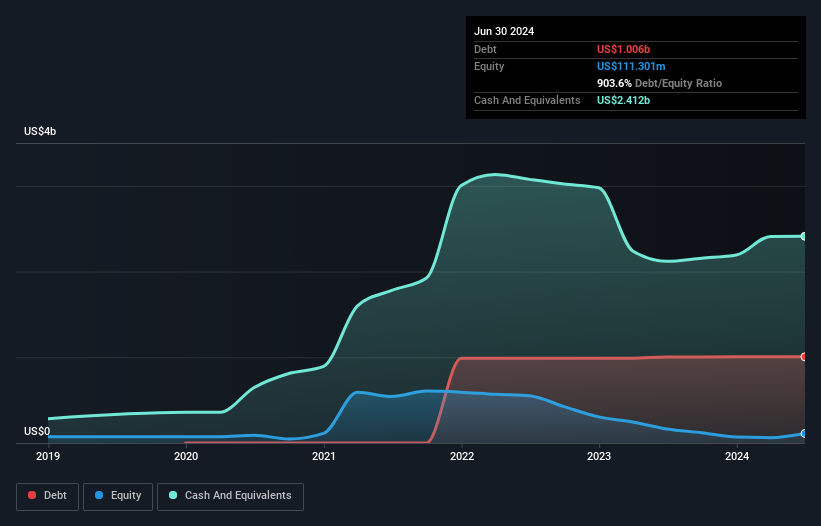Warren Buffett famously said, 'Volatility is far from synonymous with risk.' When we think about how risky a company is, we always like to look at its use of debt, since debt overload can lead to ruin. Importantly, Roblox Corporation (NYSE:RBLX) does carry debt. But is this debt a concern to shareholders?
What Risk Does Debt Bring?
Generally speaking, debt only becomes a real problem when a company can't easily pay it off, either by raising capital or with its own cash flow. In the worst case scenario, a company can go bankrupt if it cannot pay its creditors. However, a more usual (but still expensive) situation is where a company must dilute shareholders at a cheap share price simply to get debt under control. Of course, the upside of debt is that it often represents cheap capital, especially when it replaces dilution in a company with the ability to reinvest at high rates of return. The first step when considering a company's debt levels is to consider its cash and debt together.
See our latest analysis for Roblox
What Is Roblox's Debt?
The chart below, which you can click on for greater detail, shows that Roblox had US$1.01b in debt in June 2024; about the same as the year before. But on the other hand it also has US$2.41b in cash, leading to a US$1.41b net cash position.

How Strong Is Roblox's Balance Sheet?
The latest balance sheet data shows that Roblox had liabilities of US$3.30b due within a year, and liabilities of US$3.06b falling due after that. Offsetting this, it had US$2.41b in cash and US$364.6m in receivables that were due within 12 months. So its liabilities total US$3.58b more than the combination of its cash and short-term receivables.
Of course, Roblox has a titanic market capitalization of US$25.8b, so these liabilities are probably manageable. Having said that, it's clear that we should continue to monitor its balance sheet, lest it change for the worse. While it does have liabilities worth noting, Roblox also has more cash than debt, so we're pretty confident it can manage its debt safely. There's no doubt that we learn most about debt from the balance sheet. But it is future earnings, more than anything, that will determine Roblox's ability to maintain a healthy balance sheet going forward. So if you want to see what the professionals think, you might find this free report on analyst profit forecasts to be interesting.
Over 12 months, Roblox reported revenue of US$3.2b, which is a gain of 30%, although it did not report any earnings before interest and tax. Shareholders probably have their fingers crossed that it can grow its way to profits.
So How Risky Is Roblox?
Although Roblox had an earnings before interest and tax (EBIT) loss over the last twelve months, it generated positive free cash flow of US$440m. So taking that on face value, and considering the net cash situation, we don't think that the stock is too risky in the near term. One positive is that Roblox is growing revenue apace, which makes it easier to sell a growth story and raise capital if need be. But we still think it's somewhat risky. There's no doubt that we learn most about debt from the balance sheet. But ultimately, every company can contain risks that exist outside of the balance sheet. For instance, we've identified 3 warning signs for Roblox that you should be aware of.
If, after all that, you're more interested in a fast growing company with a rock-solid balance sheet, then check out our list of net cash growth stocks without delay.
New: AI Stock Screener & Alerts
Our new AI Stock Screener scans the market every day to uncover opportunities.
• Dividend Powerhouses (3%+ Yield)
• Undervalued Small Caps with Insider Buying
• High growth Tech and AI Companies
Or build your own from over 50 metrics.
Have feedback on this article? Concerned about the content? Get in touch with us directly. Alternatively, email editorial-team (at) simplywallst.com.
This article by Simply Wall St is general in nature. We provide commentary based on historical data and analyst forecasts only using an unbiased methodology and our articles are not intended to be financial advice. It does not constitute a recommendation to buy or sell any stock, and does not take account of your objectives, or your financial situation. We aim to bring you long-term focused analysis driven by fundamental data. Note that our analysis may not factor in the latest price-sensitive company announcements or qualitative material. Simply Wall St has no position in any stocks mentioned.
About NYSE:RBLX
Roblox
Operates an immersive platform for connection and communication in the United States and internationally.
High growth potential with adequate balance sheet.
Similar Companies
Market Insights
Community Narratives



